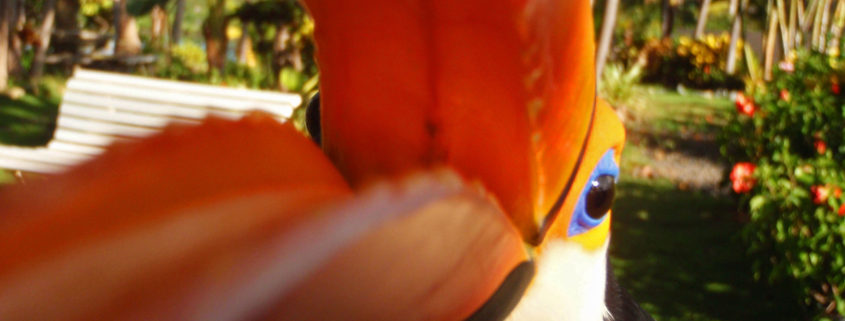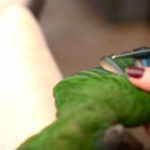Parrots use their beaks for many more reasons than aggressive biting. Most people consider any biting to be aggression. By our own reactions to a bird using its beak, we can actually cause the bird to begin a lifetime of biting. It is a mistake to measure bird behaviour by human ideas of right and wrong. How you react to your bird’s attempts to communicate will determine the outcome of your bird/human relationship.
1. Fear is easily sensed by any bird. If you display nervousness or fear, most parrots will react negatively. Why shouldn’t they ? Parrots are not birds of prey, but in fact are the prey. If you are afraid, (who are so much bigger than they are), then something must be wrong. If something is wrong , and they feel that they stand a chance of being harmed, then it is normal to protect themselves by the only means they have! BITE! Remember, we humans are predators!
2. Baby or young birds may nip when playing, or using their beak to support themselves as a third foot, or just to test you out. A bird does not view your arm as part of you, but only as a perch. In the wild it is quite acceptable to chew on one’s perch, in fact, it is necessary to wear down the beak. If a person yells “NO” or “BAD BIRD” it makes no sense to the bird. In fact. it often creates a habit of biting quite quickly. (again they feel something is wrong) It is better to gently remove the beak in a calm manner, even sustaining a few bites in the training. Another method is to have a toy with you to give the bird something it is allowed to bite. Instead of reprimanding the bird when it is naughty, try offering praise the bird when it is behaving well. We tend to scold when we don’t like the behavior but constant positive reinforcement is essential.
3. Many birds go through similar stages of development as humans do, such as the terrible two’s, or adolescence. If we remember that becoming a well rounded happy adult takes years, then we can accept on going changes in behavior as part of that development.
4. Some biting is an attempt at communication. It might be “Please don’t put your hand in my personal space!” (my cage) Or you might be poking out your finger in the bird’s face, which can be very threatening. Closed fingers generally work better. Try to listen and correctly read what your bird is trying to tell you.
5. A normally very calm bird who begins biting may not be feeling well, even if there are no other symptoms. It may be time for a vet visit to make sure that this behavior is not linked to an illness.
6. When a bird’s hormones change and it perceives that it is time to breed, aggressive, protective behavior is normal. Why not back off during this period of time, and give your bird some space, as normal behavior should return when it’s over. (Click – What do I do if my bird lays eggs?)
7. Every bird will experience anxiety sometimes. If you find it necessary to pick up your bird at that moment, try approaching it from both the front and the back at the same time with flat hands and closed fingers. Usually this avoids biting. Remember, having confidence is key.
8. Learn to read your bird’s body language! Not every bird wants to be picked up all the time. Respect this privacy. Why not just vocalize for a few minutes until the mood changes, or try again a little later. Birds do have changing moods. (hungry, tired, cranky, playful, etc.)





I have a budgie and a cockatiel. I know that the budgie and cockatiel don’t always get along but every once in a while my budgie will be in my cockatiel’s cage. I can tell that my cockatiel doesn’t always mind but sometimes he seems mad at seeing this little bird trying to move in.